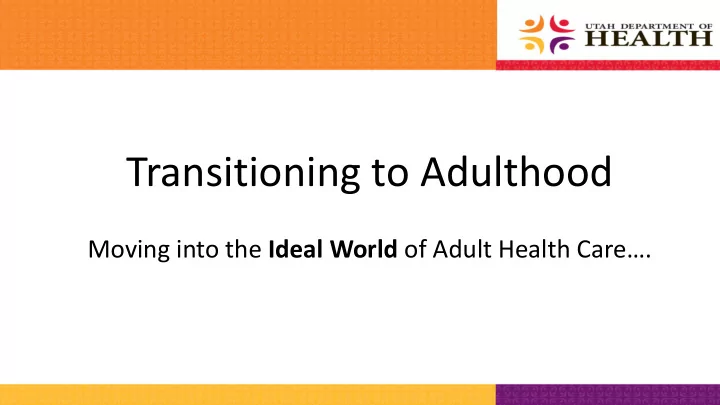

Transitioning to Adulthood Moving into the Ideal World of Adult Health Care….
Transition to Adulthood Focus on early planning (age 12-14) • Independence • Education • Employment • Healthcare • Housing
Becoming an adult The ideal…
Becoming an adult The reality…
What other issues come at us full speed once we are over 18? • Educational considerations • Social stability • Medical care (scheduling, coordinating, etc.) • Paying for medical care (insurance, self-pay) • Housing • Qualifying for state benefits
A case of appendicitis….
Moving from pediatrics to adult health care… A case of Type 1 Diabetes….
A 2011 clinical report from the American Academy of Pediatrics (AAP) entitled “Supporting the Health Care Transition From Adolescence to Adulthood in the Medical Home” stated the following:
“All youth and young adults deserve seamless access to a primary care medical home and any necessary specialty care through all of life’s transitions.” Carl Cooley, MD, FAAP (Co-chair of authoring group) “Finding adult primary and specialty care providers for youth with chronic conditions has been a challenge for pediatricians, youth and families.” Paul J Sagerman, MD, FAAP (Co-chair of authoring group) “All adolescents face unique health issues and have complex needs when it comes to care, but this is particularly true for teens dealing with chronic disease or disability.” Roland Goertz, MD, MBA, FAAFP, president of the AAFP
The 2017 National Survey of Children’s Health revealed the following about the transition to adult health care for youth ages 12-17:
The 2017 National Survey of Children’s Health revealed the following about the transition to adult health care for youth ages 12-17: At his or her last preventive check-up, did this child have a chance to speak with a doctor or other health care provider privately, without you or another adult in the room?
38.3%
Has this child's doctor or other health care provider actively worked with this child to: gain skills to manage his or her health and health care or understand the changes in health care that happen at age 18?
63.0%
Has this child’s doctor or other health care provider actively worked with this child to gain skills to manage his or her health and health care?
52.3%
Has this child’s doctor or other health care provider actively worked with this child to understand the changes in health care that happen at age 18, age 12-17 years?
49.9% said “no”
Did doctors discuss the shift to providers who treat adults, if needed, age 12-17 years?
83.4% said this was not discussed
A failed experiment in Utah…
Thank you! Eric Christensen, MPH Program Manager, Integrated Services Maternal and Child Health Bureau Utah Department of Health echristensen@Utah.gov 801-273-2951 (office phone)
Recommend
More recommend